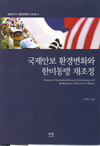This book consists of three parts and nine chapters. The first part argues that the international security order changes along with the transformation of the international security environment, and that during this process the U.S. stimulates changes to the security policy, in order to solidify its position of supremacy. Since the post-Cold War, especially after the 9.11 terrorist attacks, the U.S. is promoting a very aggressive diplomatic/security policy to strengthen its supremacy; the U.S.-led international order is expected to continue until at least 2020.
The second part examines the manner and direction of the changes in the ROK-US relations after the post-Cold War. After the inter-Korean summit in June 2000, the ROK-US relations have weakened, which immediately led to conflict between two countries. As a result, U.S. Forces in Korea have been reduced and redeployed to promote the ‘Koreanization of Korean Defense,’ and wartime operational control will also be handed over to the ROK Forces in 2012. However, this raises a question to whether South Korea, surrounded by four powerful countries, will be able to fully obtain its national security.
Hence, part three focuses on what kinds of effort the ROK Government must make in order to achieve the actual‘Koreanization of Korean Defense.’ The book further suggests a government policy that will help achieve‘self-defense,’ in relation to the ‘cooperative self-defense’ suggested by the government, and focuses on establishing Northeast Asian Multilateral Security Cooperation and strengthening the ROK-U.S alliance to secure Korea’s national security and form an international ‘security cooperation.’
No : 2008-03
Publishing Company : Hanul Books
Date of Publication : 2008
Number Of Pages : 371 Page
Price : 28000 Won
